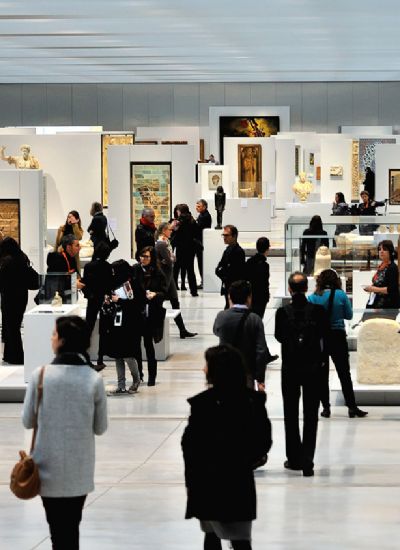Definition:
An elementary rhetorical exercise (progymnasmata) in which the speaker or writer comments briefly on a famous event or saying.
The Greek rhetorician Hermogenes of Tarsus described "a sequence of eight methods to write about a chreia: praise of the speaker quoted, an expanded restatement of the chreia, its rationale, a statement of the opposite view, a statement from analogy, a statement from example, a statement from authority, and an exhortation to follow the advice of the speaker."
(James J.
Murphy, A Short History of Writing Instruction: From Ancient Greece to Modern America, 2nd ed. Lawrence Erlbaum, 2001)
See also:
Pronunciation: CRAY-uh
Also Known As: anecdote
Alternate Spellings: chria
An elementary rhetorical exercise (progymnasmata) in which the speaker or writer comments briefly on a famous event or saying.
The Greek rhetorician Hermogenes of Tarsus described "a sequence of eight methods to write about a chreia: praise of the speaker quoted, an expanded restatement of the chreia, its rationale, a statement of the opposite view, a statement from analogy, a statement from example, a statement from authority, and an exhortation to follow the advice of the speaker."
(James J.
Murphy, A Short History of Writing Instruction: From Ancient Greece to Modern America, 2nd ed. Lawrence Erlbaum, 2001)
See also:
Etymology:
From the Greek, "useful"Examples and Observations:
- "Chreia is an important link in a series of writing steps leading to full persuasive essays. It is the first exercise in the progymnasmata sequence where the student is not merely retelling a narrative.
"In this exercise the student takes a Chreia and amplifies it through a series of topics from a fixed outline. The aim of the exercise is for the student to show why the Chreia is wise and praiseworthy.
"Along with its twin-progymnasmata, Proverb, this exercise explains the meaning of a concept or idea. Amplifying a Chreia is, in terms of content, a simple exercise. The student is easily able to generate the support for the brief anecdote because its lesson is simple and commonsensical. He is therefore able to concentrate on how to say what he wants to say, while the content of the exercise is fairly easy to choose materials for."
(Lene Mahler Jaqua, Diogenes: Chreia. Carolyn Vance, 2009)
- "In chreia, ancient students moved from composing narratives to amplifying them, sometimes by fleshing out the bare narrative but more often by adding commentary on famous deeds or utterances. The ability to amplify on a theme was much prized in antiquity and throughout the premodern period, because it demonstrated the fruits of a rhetor's long study and well-trained memory. In his sixteenth-century textbook on copia, Erasmus wrote that amplification was 'just like displaying some object for sale first of all through a grill or inside a wrapping, and then unwrapping it and opening it out and displaying it fully to the gaze.'"
(Sharon Crowley and Debra Hawhee, Ancient Rhetorics for Contemporary Students. Pearson, 2004) - "Students were given a saying or a description of an action by a famous person and assigned to work it out (ergasia) by writing a paragraph expanding and developing the meaning with the following headings: praise of the chria; paraphrase; statement of the cause; example of the meaning; contrast and comparison; testimony of others; epilogue. The chria selected as an example by Aphthonius is 'Isocrates said that the root of education is bitter, but its fruit is sweet.' In modern times students of biblical studies have shown special interest in the chria as a compositional unit in the Scriptures. The Christian mass originates in the chria of Mark 14 and Matthew 26, which describes the action and words of Jesus in offering the bread and wine to his disciples at the Last Supper."
(George A. Kennedy, A New History of Classical Rhetoric. Princeton Univ. Press, 1994) - A Student's Chreia on "The ballot is stronger than the bullet" (Abraham Lincoln)
It is fitting that we remember Abraham Lincoln as the great emancipator of our country. His leadership during and after the Civil War demonstrated the unique balance of power and compassion. Governments that allow citizens the forum to address issues rather than use power to rule over their subjects are governments that are able to endure. Lincoln's belief even in the darkest days of our country was that the government is ruled by the people and not the military. The ability to vote is the essential element of democracy. It is that ability that determines not only our own future but our children's as well.
Governments that rule with an iron fist rule with fear. It is in these governments, as Lincoln suggests, that the power is taken from the people. Inevitably, these governments will be weaker than a country run by the poeple.
An example of Lincoln's democracy at work is the presidential elections every four years. In many militant countries the president is decided by means of force, while in a democracy the process is decided in an open vote. In regards to democracy, Lincoln understood that the power to vote was America's strongest weapon.
(Steve Ray, 1999)
Pronunciation: CRAY-uh
Also Known As: anecdote
Alternate Spellings: chria




















